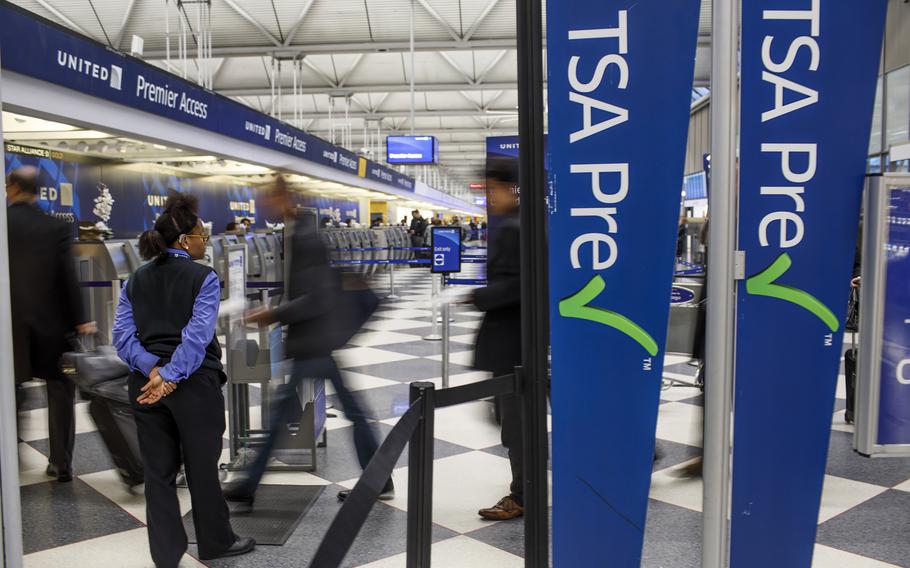
Passengers walk through the entrance of a TSA PreCheck in at O'Hare International Airport in 2017 in Chicago. (Armando L. Sanchez/Chicago Tribune/TNS)
The Transportation Security Administration has altered a plan that would have required all travelers enrolled in Clear’s expedited screening program to undergo additional identification checks, even as reports have surfaced about additional security incidents.
In a letter to the company last week, the TSA said it would require that a smaller proportion of Clear members undergo additional identity vetting, according to two people Thursday who have seen the letter but weren’t permitted to speak publicly about it. The shift from screening all travelers to a lower percentage is a victory for a company whose business model depends on speeding travelers through the airport screening process, in part, by skipping the same identification checks required of other travelers. Clear has aggressively pushed back against the TSA’s plan.
The change — which still would slightly increase the number of passengers screened because TSA never came close to its short-lived goal of all passengers — comes despite reports of security breaches at two airports involving Clear earlier this year.
TSA officials would not comment on the reason for the shift. In a statement, the agency said it is committed to ensuring the highest degree of aviation security.
“TSA is responsible for ensuring that all systems and programs, including those provided by private companies, meet requisite standards and will take necessary steps to ensure security needs are met,” the agency said in a statement. “Accurate and reliable verification of passenger identity is foundational to aviation security.”
Clear did not respond to questions about the change.
Several lawmakers say they are concerned about Clear’s operations and whether the company is doing enough to close security gaps.
“After being briefed that there have been multiple security breaches over the past year due to Clear’s lax security controls, TSA needs to ensure all travelers’ identities are verified by TSA in real time, as we have urged TSA to do since December,” said Rep. Bennie G. Thompson, the top Democrat on the House Homeland Security Committee. “Further delaying this puts our aviation system at unnecessary risk.”
In the wake of a security breach involving Clear’s screening program last year, Thompson was among lawmakers who demanded the TSA require Clear members show their physical identifications to TSA personnel before being allowed to enter the screening line. In a report that accompanied a bill to fund the Department of Homeland Security, members of the Senate Appropriations Committee also “strongly” encouraged TSA to “verify the identity of all passengers enplaning at TSA-regulated airports,” including those who are part of registered traveler services, such as Clear.
TSA appeared to be heeding those calls. In a letter to the company in July, TSA said a requirement to check IDs of all passengers would take effect at the end of that month, according to three people with knowledge of the exchange who weren’t permitted to speak publicly.
In a January incident, first reported by Politico, a Clear employee allowed a passenger to enter the TSA screening line, even though the person’s boarding pass was for a flight departing from a different airport. The mistake was discovered when the person realized the mistake and went back to the to the TSA checkpoint, two people with knowledge of the incident told The Washington Post.
In February, a traveler found a discarded boarding pass in an airport garbage can and used the Clear line to get through to airport screening. The mistake was discovered when the person tried to board the flight. The person to whom the boarding pass belonged already had boarded the flight, the people said.
In an emailed statement, Clear spokeswoman Annabel Walsh said the employees involved in the two incidents violated the company’s strict protocols by improperly bringing two travelers to TSA security without properly verifying them. Walsh said the employees and their supervisors were fired. The company is now retraining employees at all its locations.
In a July 2022 incident, first reported by Bloomberg, a man used a fake ID to enroll in Clear and was able to fly from Alabama to Reagan National Airport. On his return trip, he was flagged by TSA officers after they found ammunition in his carry-on bag. When questioned, they discovered he was traveling with false identification.
Most people pay $189 a year for a Clear membership, although some airlines and credit card companies offer discounts. Once enrolled, Clear members have access to their own security lines at 52 U.S. airports. After Clear members verify their identities at company kiosks, they are escorted to the front of the security line for screening.
The TSA operates its own expedited screening program, PreCheck, which also gives enrollees access to a separate security line. As part of the program, which costs $78 for five years, individuals undergo a background check, interview and provide fingerprints. PreCheck customers still must have their identification checked by a TSA officer, but once cleared, they don’t need to remove their shoes, belts, travel-sized liquids, laptops or jackets during screening.